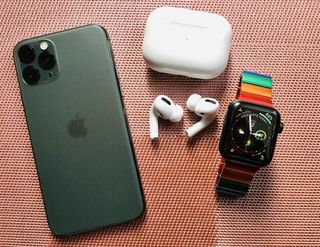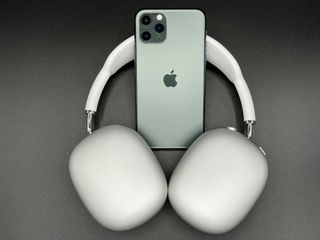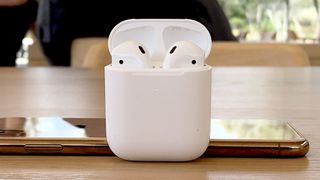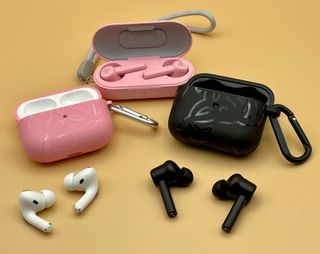Why Apple AirPods continue to dominate the earbuds market

Apple initially launched the first-generation AirPods in December 2016. There were plenty of memes and jokes about the "interesting" design at the time, but little did we know that AirPods would essentially transform the wireless earbud market as we knew it.
It has been over three years since the original AirPods, and since then, we've seen the second generation of AirPods, as well as AirPods Pro and AirPods Max. At the same time, many other companies seem to have taken inspiration from Apple and released true wireless earbuds that look very similar to AirPods. While some may appear to offer a better value for the money, others have price points that are competitive with Apple's. But none of them really have the same momentum or popularity as Apple AirPods do — why?
Apple has complete control over AirPods, so they seamlessly integrate with the ecosystem

A lot of Apple critics like to point out the walled garden of Apple is a negative, but when it comes to AirPods integration, it's actually one of the biggest strengths. Apple's AirPods, no matter which generation or version you have, will automatically (and magically) connect to your iPhone, iPad, Apple Watch, Apple TV, and Mac when you hold them near each other. Once the AirPods are paired with one device, it should show up on any other Apple device that you use, as long as you're logged in to the same Apple ID. So if you want to switch between your iPhone and Mac, then the AirPods should have no problem swapping.
Other wireless earbuds don't have that same kind of tight integration that Apple has. The earbuds from competitors are made to work across a huge variety of devices with Bluetooth and may have some bonus features similar to what AirPods offer, including different voice assistants. However, if you're an Apple user, they don't work as well (or make sense) as AirPods do. Plus, with a mishmash of different brands for earbuds, smartphones, and even computers, you can't expect all of the same features to be available on every device you want to use them with.
For example, one of the best things about AirPods is how they automatically pair once you flip the case open. This kind of functionality eventually made its way to earbuds like Google's Pixel Buds, which works great with Android devices, but we can't deny the fact that Apple did it first. And while the Pixel Buds work seamlessly with your Android smartphone, you'll miss out on some advanced features if you use them with your PC or Mac. With Apple, you don't really lose out on features even if you use them with your Mac.
People may not always like the fact that Apple's ecosystem pretty much locks you in, but when it comes to things like AirPods, it's necessary for a completely seamless experience. And chances are high that if you're an Apple user, you have more than one Apple device in your home. Having a flawless integration with your audio products, like earbuds, just makes life easier.
It's not about being first, but getting it right

When it comes to tech, Apple is almost never first. With the iPod, there were a ton of MP3 players out in the world before Steve Jobs launched the iPod. After the iPod became a thing, MP3 players that came out afterward tried to copy Apple — remember the Zune? Some people liked them, but none of them really dominated the market aside from Apple, and the same exact thing can be said about the AirPods. The AirPods, like the iPod, came out at a time that could fix everything that the competition continued to get wrong.
Back in 2016, when the AirPods debuted, Bluetooth headphones were starting to peak. An NPD report from 2016 reveals that at the time, Bluetooth headphones accounted for just 54% of sales in the category. Bluetooth headphones have been around since 2004, but only began to take off around 2010. Once Apple removed the headphone jack from the iPhone 7 in 2016, other smartphone makers followed suit not long after. These days, it's hard to find a headphone jack on a smartphone or tablet, which has undoubtedly helped propel sales of Bluetooth headphones.
But before AirPods, as convenient as Bluetooth headphones were, they still had a lot of shortcomings. The battery life was not great, "wireless" earbuds were connected by behind-the-neck wires, and they still had complicated pairing processes. With AirPods, you got seamless pairing (especially with Apple devices), a charging case that provided even more battery life throughout the day, and Siri integration, which was unheard of with other brands. As Apple continued to release newer versions of the AirPods, AirPods Pro, and AirPods Max, new features got added like Spatial Audio, Active Noise Cancellation, and Transparency.
There's also no denying the fact that Apple is ace when it comes to marketing. With so many people owning Apple products or even considering purchasing new ones, AirPods became the first truly wireless earbuds for many non-techie people. Oh, and let's not forget that wireless earbuds really got a push once the headphone jack was removed from the iPhone 7 and onwards.
Apple certainly didn't invent wireless earbud technology, but they sure knew how to get it right.
A lot of the competition just doesn't cut it

If you have a few different Apple products that you use on a regular basis, then I'll get straight to the point — a lot of truly wireless earbuds aren't that great.
I've tried the Google Pixel Buds and even Razer's Hammerhead True Wireless Pro. These are fine for Bluetooth earbuds, but they don't offer the same seamless experience that AirPods provide. While Pixel Buds may work like AirPods on Android devices, with an iPhone, they're just another pair of Bluetooth earbuds. And the Hammerhead True Wireless Pro has a very AirPod Pro-like design, but again, you need to use a wonky third-party app to adjust settings, the touch controls are very sensitive, and they don't have wireless charging (bummer!)
A lot of companies have been coming out with their own versions of "AirPods" clones with slight cosmetic differences, but you have to do more than take inspiration from the style of AirPods. Of course, I highly doubt that Apple will ever allow third-party companies access to the proprietary H1 chips that make all of the integration possible. So while everyone continues to make earbuds inspired by AirPods, they'll never be as great as the real thing.
Of course, when it comes to the AirPods Max, it's a little different. That's because while these sound amazing and have some of the best ANC I've had on a pair of headphones, they're just way too expensive for most people, as I noted in my AirPods Max review. If you take away the seamless integration aspect, then alternatives like Sony's WH-1000XM4 headphones are a good option and cost a little less than AirPods Max. Just understand that they're not going to be as heavily integrated with the Apple ecosystem as AirPods Max, but they sure sound amazing and have great ANC to tune everything out.
Your thoughts?
Apple AirPods and AirPods Pro continue to dominate the true wireless earbud market, and for good reason. They have the best feature integration with multiple Apple devices thanks to a closed ecosystem, Apple marketing has generated strong momentum, and there's just more to them besides the looks. While other companies can continue making their own AirPods "killers," they really won't be entirely on the same level as Apple and AirPods.
What do you think? Do you use AirPods? Or do you prefer another brand of true wireless earbuds? Let us know in the comments.
Master your iPhone in minutes
iMore offers spot-on advice and guidance from our team of experts, with decades of Apple device experience to lean on. Learn more with iMore!
Christine Romero-Chan was formerly a Senior Editor for iMore. She has been writing about technology, specifically Apple, for over a decade at a variety of websites. She is currently part of the Digital Trends team, and has been using Apple’s smartphone since the original iPhone back in 2007. While her main speciality is the iPhone, she also covers Apple Watch, iPad, and Mac when needed. When she isn’t writing about Apple, Christine can often be found at Disneyland in Anaheim, California, as she is a passholder and obsessed with all things Disney, especially Star Wars. Christine also enjoys coffee, food, photography, mechanical keyboards, and spending as much time with her new daughter as possible.

